Science, Sustainability, Singing, Stir-fry, and Snacks!

I met them on August 1st. Twenty bright new faces arrived on buses and vans at the Wilderness Information Center in Marblemount. As they walked quietly out of the vehicles, sleepy from early morning pick-ups at high schools from Bellingham to south of Seattle, I could tell right away that they were older than the rest of our Youth Leadership Adventures participants this summer—mostly because 90% of them were taller than me…
These 16-18 year olds from western Washington and Oregon had been selected for our Science and Sustainability program. They were about to spend 15 days in the North Cascades—11 days backpacking and canoeing on Ross Lake, followed by four days of staying at the Learning Center and camping in Marblemount, all the while studying science, sustainability, leadership, and community.
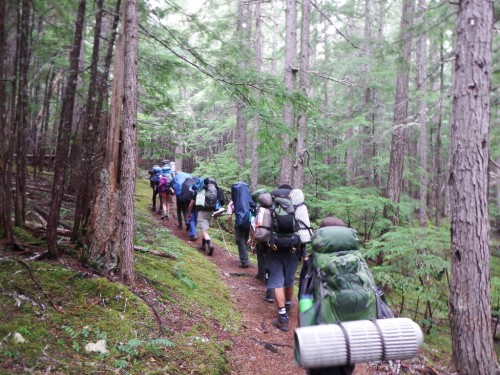 Backpacking down Ross Lake. Photo by Institute staff and graduate students
Backpacking down Ross Lake. Photo by Institute staff and graduate students
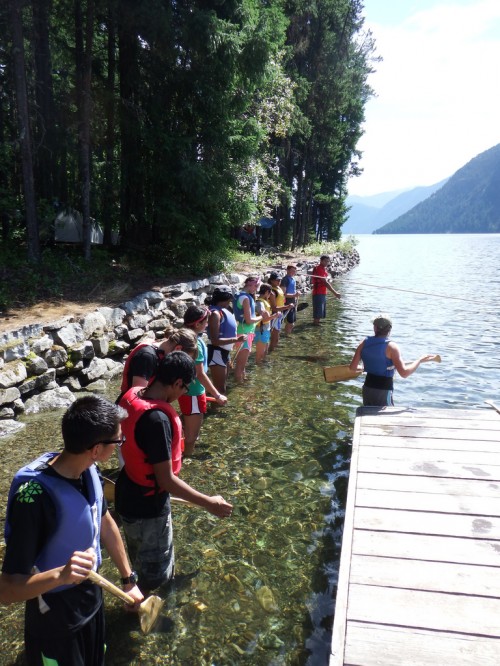 The students practicing their paddling strokes before loading the canoes. Photo by Institute staff and graduate students
The students practicing their paddling strokes before loading the canoes. Photo by Institute staff and graduate students
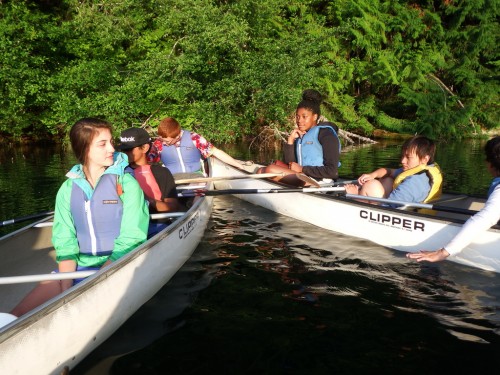 Chillin’ on the water for a bit during a break from paddling. Photo by Institute staff and graduate students
Chillin’ on the water for a bit during a break from paddling. Photo by Institute staff and graduate students
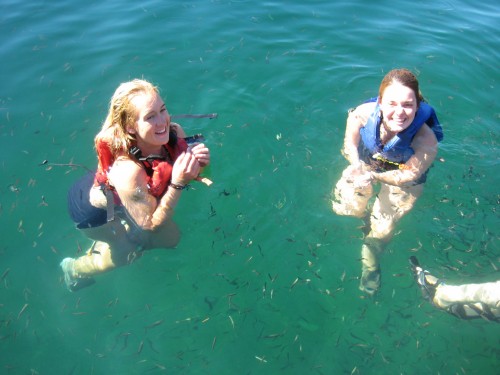 Swimming with Red-sided shiners in Ross Lake. Photo by Institute staff and graduate students
Swimming with Red-sided shiners in Ross Lake. Photo by Institute staff and graduate students
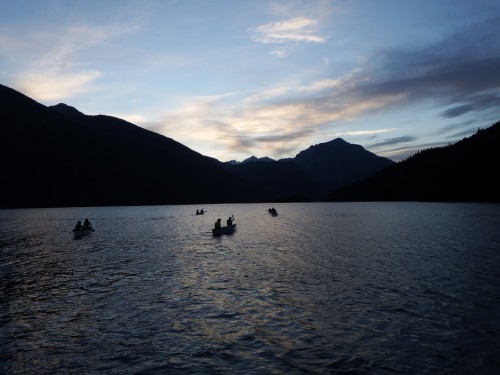 An early morning canoe to the Desolation Mountain trailhead. Photo by Institute staff and graduate students
An early morning canoe to the Desolation Mountain trailhead. Photo by Institute staff and graduate students
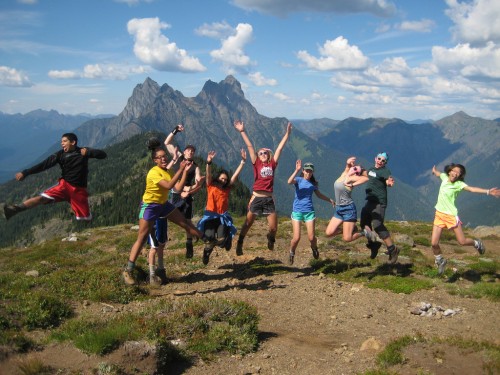 Leaping with the joy of having climbed 4,400 feet in just under five miles to the top of Desolation Peak. In the background stands the twin peaks of Hozomeen Mountain. Photo by Institute staff and graduate students
Leaping with the joy of having climbed 4,400 feet in just under five miles to the top of Desolation Peak. In the background stands the twin peaks of Hozomeen Mountain. Photo by Institute staff and graduate students
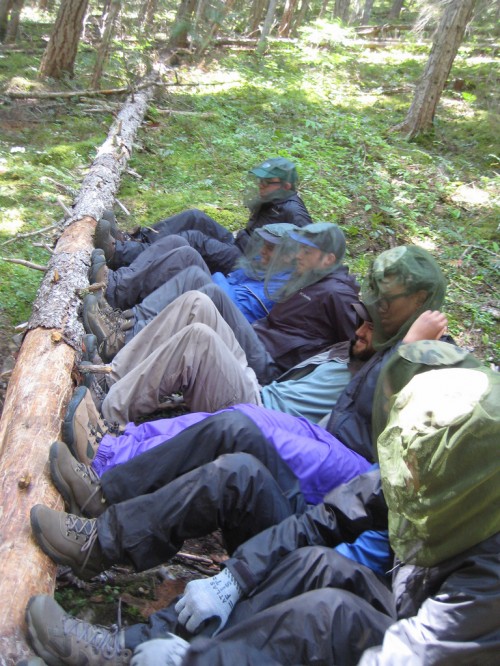 Working as a team to move logs while doing trail work in very hot and mosquito-y conditions. Photo by Institute staff and graduate students
Working as a team to move logs while doing trail work in very hot and mosquito-y conditions. Photo by Institute staff and graduate students
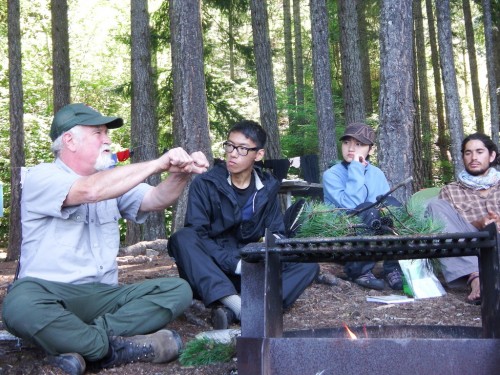 North Cascades National Park Ranger (and co-owner of Blue Heron Farm), Mike Brondi, teaching the students about Lodgepole pine cones. They’re serotinous, which means they need fire to open and release the seeds. Photo by Institute staff and graduate students
North Cascades National Park Ranger (and co-owner of Blue Heron Farm), Mike Brondi, teaching the students about Lodgepole pine cones. They’re serotinous, which means they need fire to open and release the seeds. Photo by Institute staff and graduate students
Although I had planned on being one of the instructors for this backcountry trip, one mis-step in March resulted in me falling off a log and tearing my ACL. Now unable to accompany them on their backpacking and canoe-camping adventures, my co-workers graciously allowed me to take over much of the teaching and facilitation when they returned to the front-country. I studied up on climate change and agriculture so I could take the students to a local farm and teach them about how our food system and climate change are affecting each other.
By the time I met back up with them after their 11 days on Ross Lake, two close-knit groups had formed—The Loonies (named after loons they heard and saw at Hozomeen Lake) and the Ross Lake Salad Baggers.
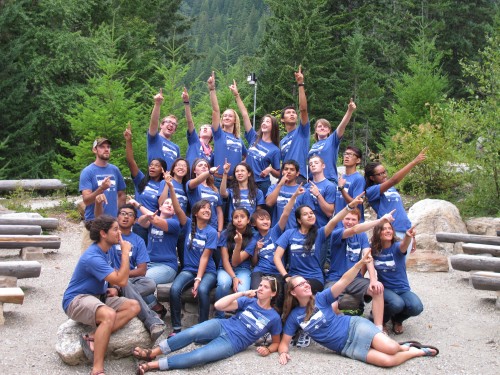 The 20 very serious Science and Sustainability students with their instructors, right before doing their evening presentation. Photo by Institute staff and graduate students
The 20 very serious Science and Sustainability students with their instructors, right before doing their evening presentation. Photo by Institute staff and graduate students
After spending one night at the Learning Center cleaning and re-packing all their gear (and doing a couple loads of laundry) we headed west toward Marblemount. One group continued northwest up to Baker Lake to meet Jon Riedel, the Park glaciologist to learn about glaciers. They spent the day hiking up Railroad Grade to the toe of a real-life glacier. I went with the other group slightly southwest to Blue Heron Farm in Rockport. There we met up with Anne Schwartz and Mike Brondi who own the farm.
While the other folks worked up a sweat hiking uphill, we strolled around the farm eating our way through carrots, beets, fennel, arugula, zucchini, cucumber, corn, perslain (an edible weed), and more, all directly from the plants. Anne told us about coming out here from New Jersey in the 1970s and starting the farm, her participation and leadership in the Washington organic movement, and what it’s like to live off the land. Mike (who’s “day job” is working for the National Park Service) showed us how to make musical instruments from the hollow stems of zucchini plants.
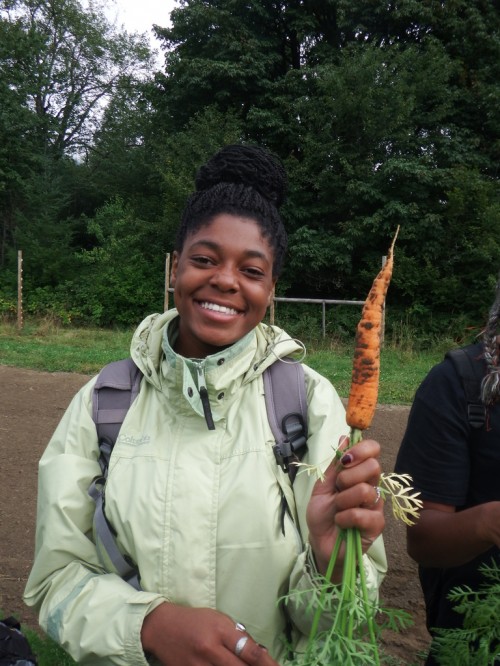 A freshly pulled carrot. Photo by Institute staff and graduate students
A freshly pulled carrot. Photo by Institute staff and graduate students
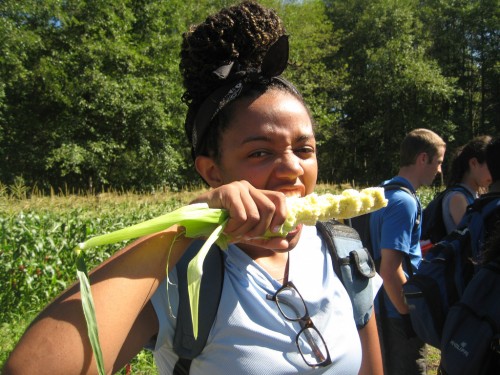 “Here, try this,” Mike Brondi said, breaking an ear of corn off its stalk and shucking it in the field. Photo by Institute staff and graduate students
“Here, try this,” Mike Brondi said, breaking an ear of corn off its stalk and shucking it in the field. Photo by Institute staff and graduate students
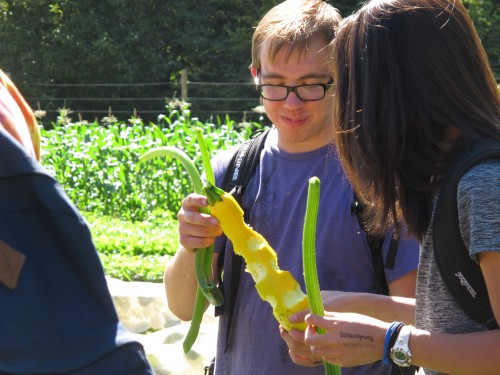 The students passed around a yellow squash, biting chunks out of the raw vegetable. Photo by Institute staff and graduate students
The students passed around a yellow squash, biting chunks out of the raw vegetable. Photo by Institute staff and graduate students
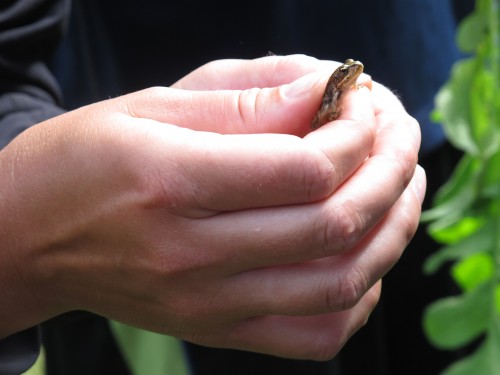 As we walked across a shaded piece of the property someone pointed to little frogs jumping up around our feet. Here, one is carefully examined by the group. Photo by the author
As we walked across a shaded piece of the property someone pointed to little frogs jumping up around our feet. Here, one is carefully examined by the group. Photo by the author
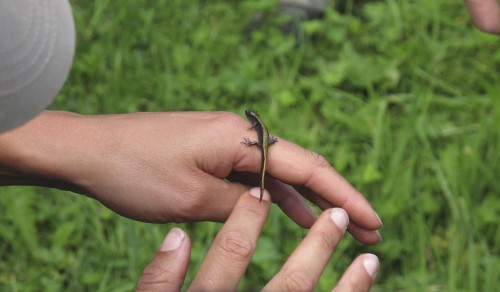 Another observant eye noticed this salamander amongst the grass. Photo by the author
Another observant eye noticed this salamander amongst the grass. Photo by the author
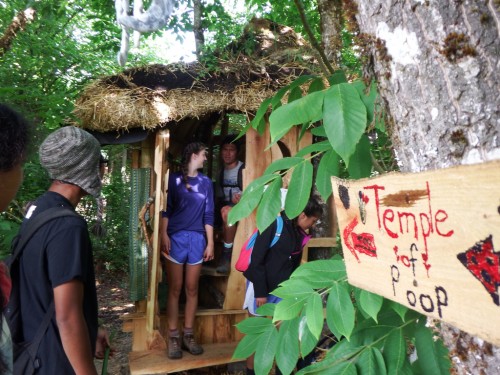 Our tour concluded as lunch approached, but not before letting us walk past the newest structure on the property—a composting toilet dubbed the “Temple of Poop.” Photo by Institute staff and graduate students
Our tour concluded as lunch approached, but not before letting us walk past the newest structure on the property—a composting toilet dubbed the “Temple of Poop.” Photo by Institute staff and graduate students
After lunch we talked about why this farm doesn’t use any pesticides and therefore has weeds, and then helped to weed several long rows of carrots. We were all struck by how much work it was even when all 15 of us worked together. Running a farm is a lot of hard work—and very rewarding. The next day the groups swapped and I explored the farm with the other group.
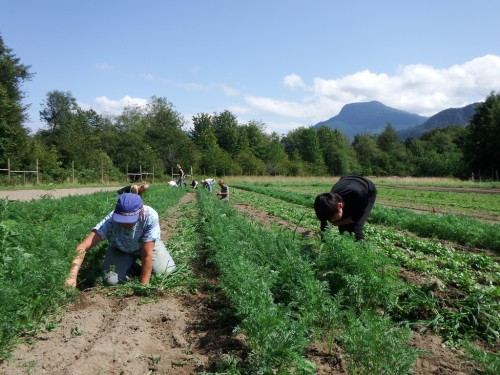 Anne Schwartz (on the left) weeding rows of carrots with us. Photo by Institute staff and graduate students
Anne Schwartz (on the left) weeding rows of carrots with us. Photo by Institute staff and graduate students
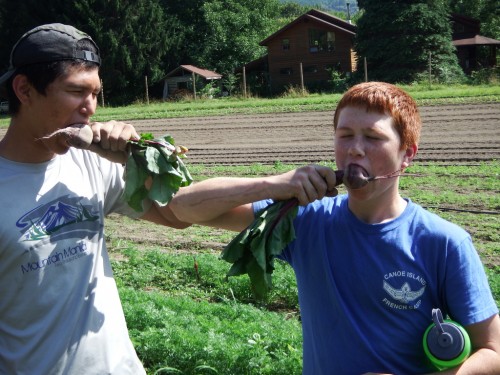 Two students noticed something odd—a few beets growing in with the rows of carrots. According to Anne, there were some leftover beet seeds in the bucket when they started planting carrots. “You can go ahead and try one if you want,” she encouraged the students. Photo by Institute staff and graduate students
Two students noticed something odd—a few beets growing in with the rows of carrots. According to Anne, there were some leftover beet seeds in the bucket when they started planting carrots. “You can go ahead and try one if you want,” she encouraged the students. Photo by Institute staff and graduate students
The students spent their last full day in the North Cascades preparing a presentation about their experience to give that evening at Colonial Creek Campground. Both groups worked together, splitting into pairs to tell stories about what they did and learned, as well as explaining what on earth the “Youth Leadership Adventures: Science and Sustainability” program is. These were particularly talented and creative musical folks so we were serenaded in between the stories with songs and raps they had written themselves. I know I wasn’t the only one in the crowd who left with an overwhelming feeling of “Wow.”
Wow, these kids are amazing. Wow, they just spent more time in the backcountry with heavier packs than a lot of adults I know. Wow, a lot of them started out way outside their comfort zones, having never canoed or backpacked before. Wow, this is the future and they’re making me feel hopeful for this planet.
I hope this isn’t the last I see of these students. I hope they come back for other programs with North Cascades Institute or the National Park Service or some other organization. I hope they use their voices and speak loud and make the changes they spent two weeks talking about. I hope that as they grow up and move on and do different things they don’t forget the incredible community they built on the shores of Ross Lake during the summer of 2013.
Ryan Weisberg is a graduate student in North Cascades Institute and Western Washington University’s M.Ed. program. Ryan grew up here in Washington, exploring the natural areas around Bellingham and in the Cascades. Passionate about writing since childhood, Ryan served as Chattermarks editor during their year-long residency at the North Cascades Environmental Learning Center. Ryan continues to enjoy writing for the blog.

